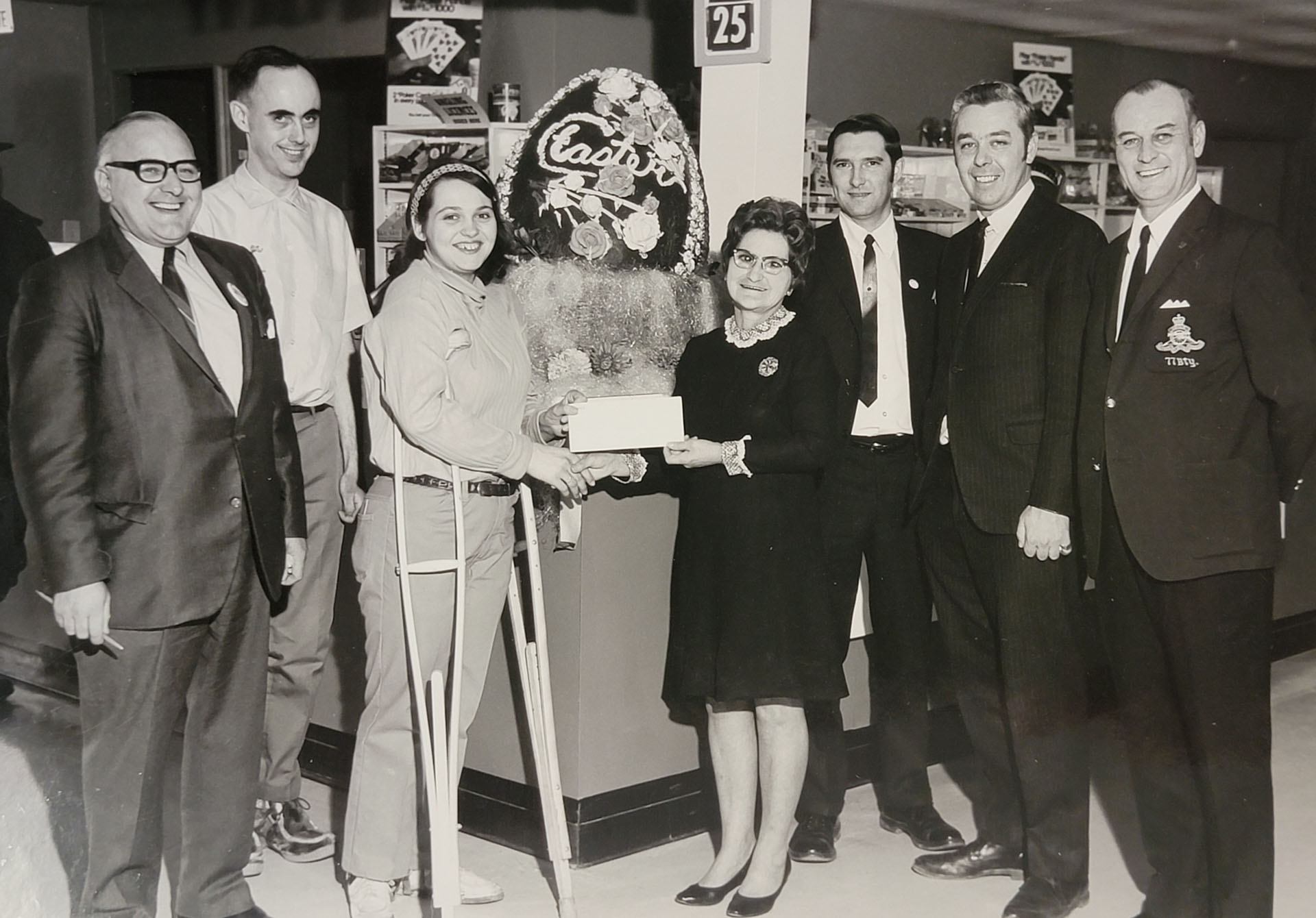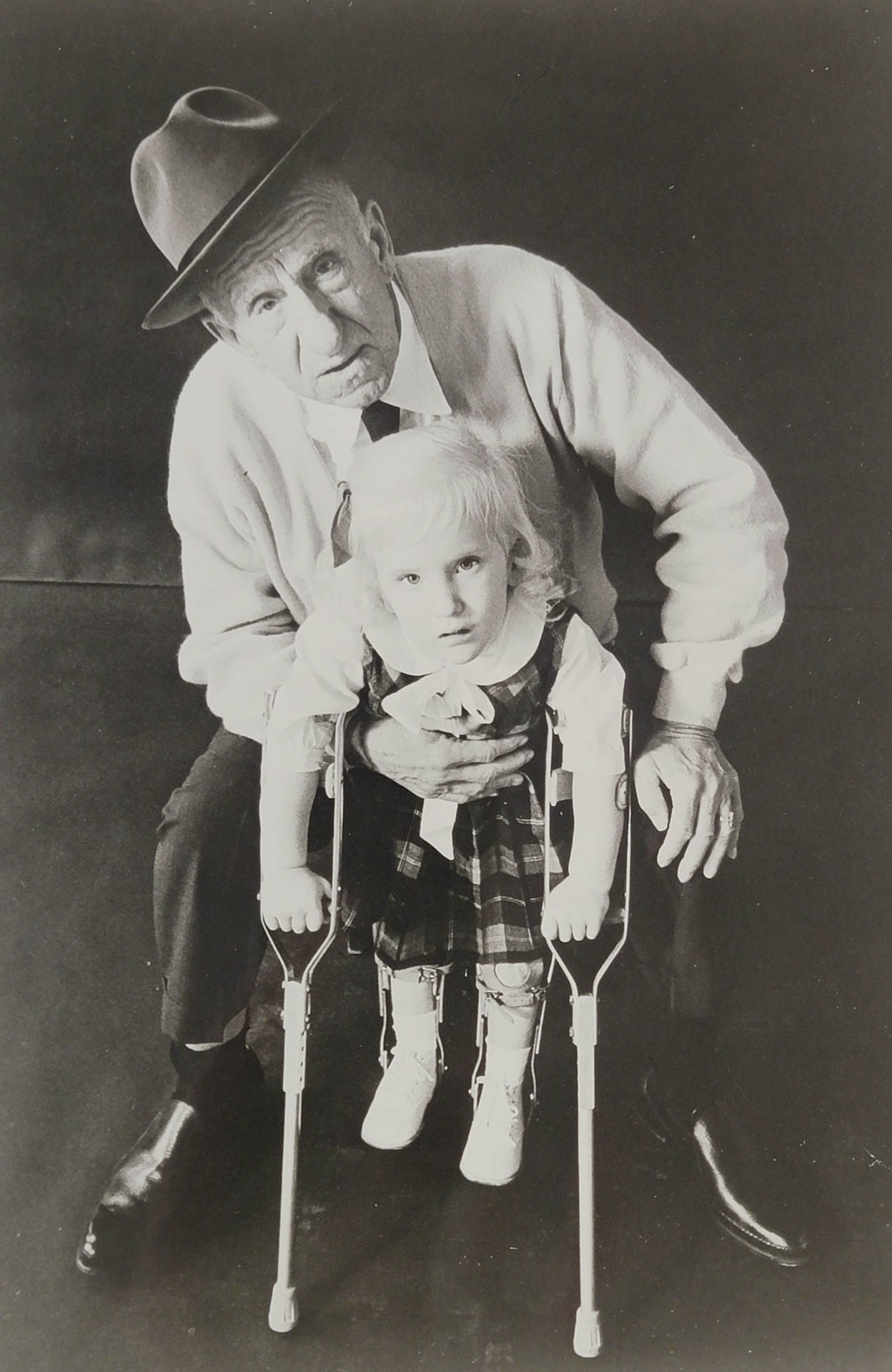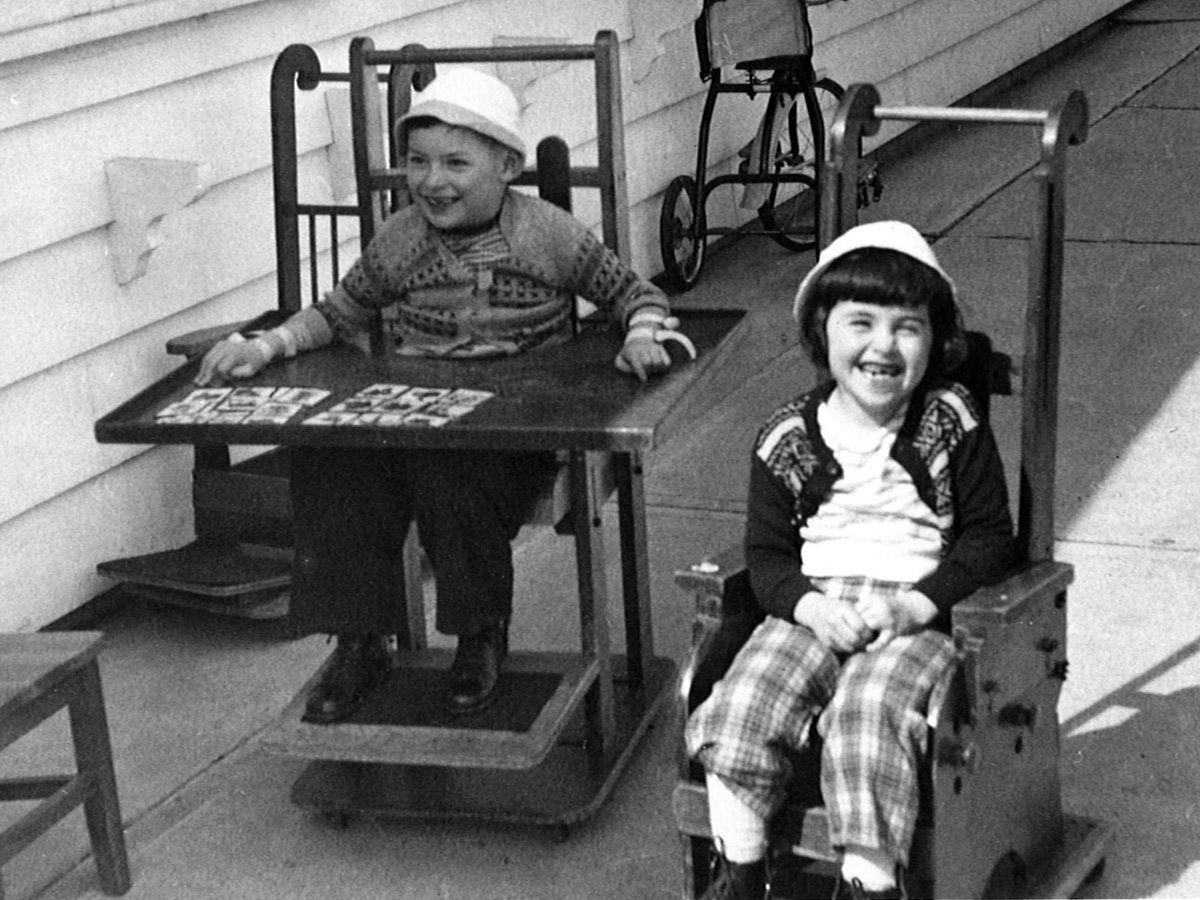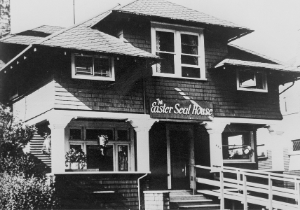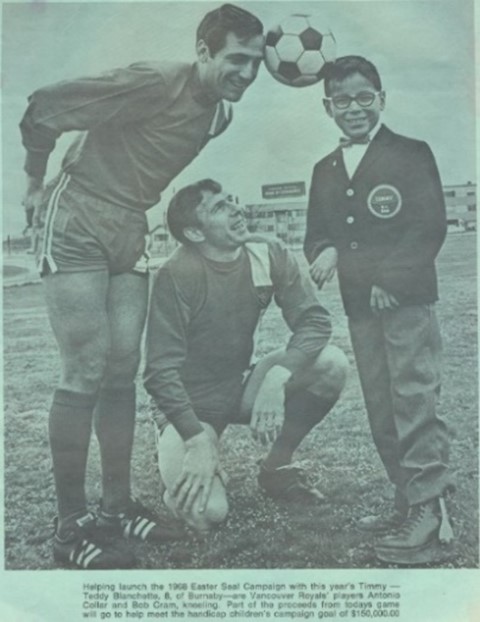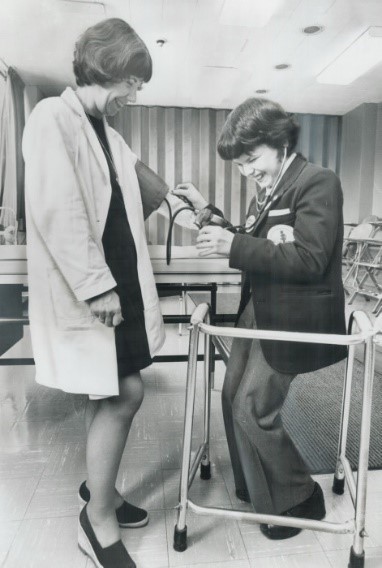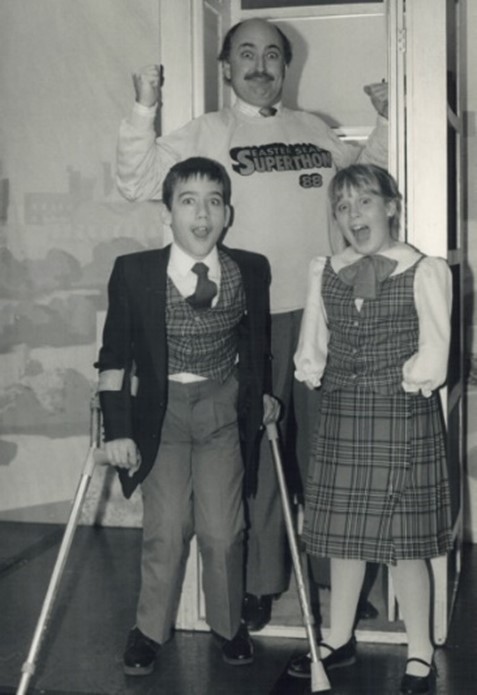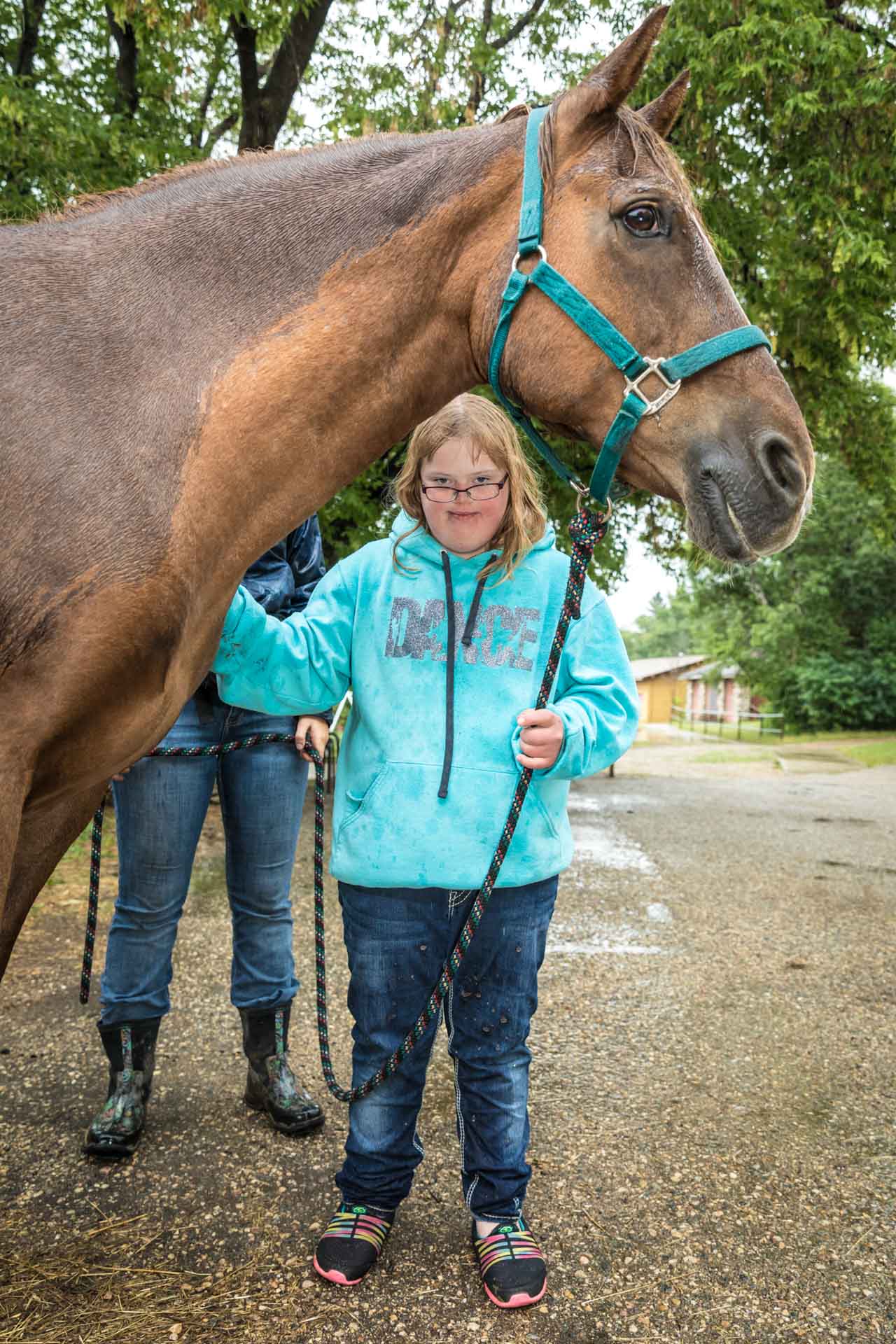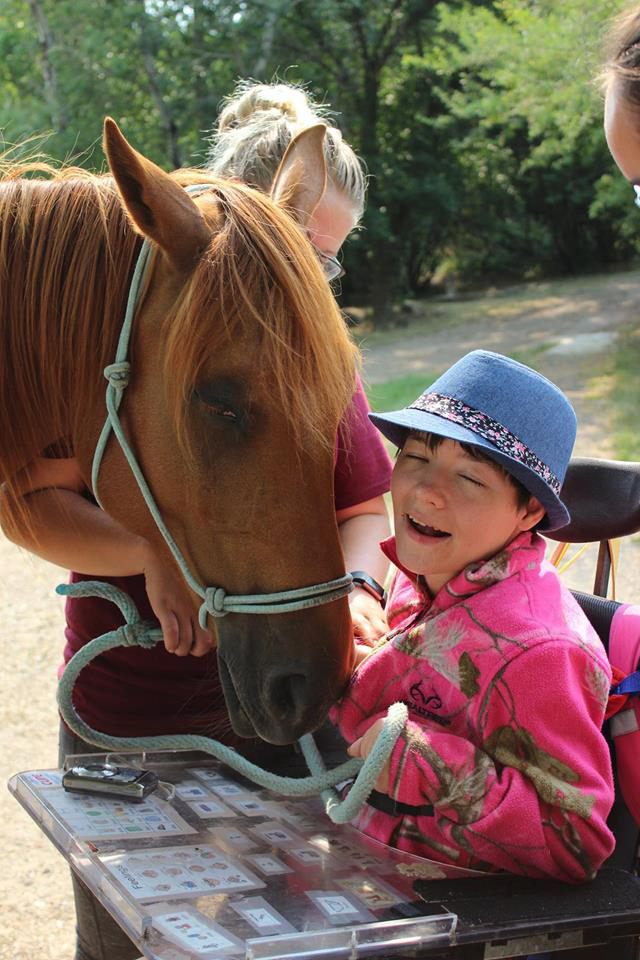


1920s
The Beginning
The launch of Easter Seals in Canada.
On November 28, 1922, in Windsor, Ontario, representatives from seven Rotary Clubs came together to discuss the inadequate resources and support available for the province’s children with physical disabilities. This newly formed group, the Ontario Society for Crippled Children, sought to emulate the success of the Easter Seals program in the U.S. and is now known as Easter Seals Ontario.
1930s
A Foundational Decade
A time of growth and activity.
1930
“Société de secours aux enfants infirmes” was founded in Quebec. Today, it is known as Fondation Papillon/Timbres de Pâques Québec.
1931
The incorporation of Nova Scotia Society for the Care of Crippled Children took place; this organization is now known as Easter Seals Nova Scotia.
Easter Seals launched a public information campaign for universal pasteurization of milk to help prevent tuberculosis.
1934
Easter Seals’ first Canadian public fundraising appeal was held at the Royal York Hotel in Toronto.
1937
Through the generous support of Rotary Clubs, Easter Seals opened Blue Mountain Camp in Collingwood, Ontario – the first Canadian camp for children with physical disabilities.
The Rotary Sunshine Camp Association was also formed to establish a summer camp for children just outside St. John’s in Newfoundland. This is now known as Easter Seals Newfoundland and Labrador.
1940s
A National Beginning
Continued growth and expansion.
In 1947, the first Easter Seals direct mail campaign was introduced in Ontario. March was also dubbed Easter Seals Month during this year.
1940s
1948
The “Coordinating Council for Crippled Children (Alberta) was formed. The Council had obtained the franchise for the distribution of Easter Seals in this province as its means of fundraising; today it is known as Easter Seals Alberta.
Horace Brown, a Canadian affected by polio, visited the National Foundation for Infantile Paralysis to determine whether he could help the fight against polio. He then established the Canadian Foundation for Poliomyelitis, also known as the Canadian March of Dimes, patterned after the US organization. This was the inception of Easter Seals Canada.
During the 1940s, the Easter Seals ambassador program began, with Lynn Berry selected as the first provincial “Timmy” to represent all children with physical disabilities.
1950s
A Busy Decade
More provincial chapters founded.
In the first year of this decade, the Society for Crippled Children was founded to assist children with disabilities in Manitoba. Its name would eventually change to the Society for Manitobans with Disabilities and is known today as Manitoba Possible/Easter Seals Manitoba. Also, parents of children with cerebral palsy founded the Saskatchewan Council for Crippled Children (SCCC), which is now known as SaskAbilities/Easter Seals Saskatchewan.
1950s
1952
The Lions Clubs and other community leaders established the British Columbia Lions Society for Children with Disabilities to help families and children with disabilities, which is now known as Easter Seals British Columbia & Yukon.
The first Conn Smythe Sports Celebrities Dinner and Auction, a fundraiser founded by the Ontario Sportswriters and Sportscasters Association, was held in Toronto.
1955
The first Easter Seals House opened in Vancouver with five units, providing out-of-town families with affordable accommodations when they had to bring their sick children to Vancouver for medical treatment. Since that time, Easter Seals House has grown to 49 suites.
1956
The New Brunswick Coordinating Council for the Handicapped was launched, representing 57 member organizations from throughout the province. This organization is now known as Easter Seals New Brunswick – Timbres de Pâques Nouveau-Brunswick.
The Rotary Club of Charlottetown (Prince Edward Island) voted to adopt Easter Seals as the program through which to continue its support of children with disabilities; today it is known as Easter Seals Prince Edward Island.
1960s
Rewarding Leadership
Highlighting leaders across Canada
In 1962, Len Headley was named recipient of the very first Easter Seals Canada Leadership Award for exceptional leadership and dedication to children with disabilities through involvement with Easter Seals agencies across Canada. In 1968, the Easter Seals Canada Leadership Award was presented to Foster Hewitt, Conn Smythe, Waldo Holden, and Phil Stone; and in 1969 the Easter Seals Canada Leadership Award was presented to Whipper Billy Watson.
1970s
More Great Gains
Fundraising breakthroughs and formal alliances.
In 1975, Canada’s first wheelchair-accessible group home for young adults with physical disabilities was opened in Edmonton, Alberta. As well, Whipper Billy Watson hosted the first Snowarama event in 12 communities throughout Ontario, raising a total of $130,000 in its first year.
1970s
1976
Industrial Workshop in Manitoba became the Employment Preparation Centre to focus on preparing clients with disabilities for employment.
1977
The Easter Seals Canada Leadership Award was presented to Harold Ballard.
1978
Easter Seals was instrumental in establishing a network of children’s treatment centres throughout Ontario and creating a formal alliance, later known as Ontario Association of Children’s Rehabilitation Services (OACRS) and now as Empowered Kids Ontario (EKO).
1979
The Easter Seals Canada Leadership Award was presented to George Cohon.
CENTURY 21 began support of Easter Seals organizations in North America (currently in its 13th year as a National Partner to Easter Seals Canada).
D.P. Murphy Inc. sponsored the first Tim Hortons Easter Seals Ambassador School Tour in PEI.
1980s
Partners that Care
The start of an important relationship.
In 1983, Friends of We Care (now We Care) became a national corporate partner to Easter Seals, raising funds each year to allow more Canadian children with disabilities to attend accessible camps. In 1984, Easter Seals adopted the annual naming of both a “Timmy” and a “Tammy” to represent children with physical disabilities. A minimum wage guaranteed to sheltered clients of the Employment Preparation Centre in Manitoba was also established. In 1987, the Easter Seals Canada Leadership Award was presented to Gary Wright.

1990s
In 1995, acting on the recommendation of a Canadian Rehabilitation Council for the Disabled (CRCD) Task Force Report, the name of the national organization was changed to Easter Seals/March of Dimes National Council.
2000s
A New Name
Significant growth in programming and recognition.
At the outset of the decade, the “Timmy and Tammy” program was renamed to the Easter Seals Provincial Ambassador Program. The following year, Easter Seals received the Conference Board of Canada/Spencer Stuart National Award in Governance for demonstrating innovative and successful application of leading private sector business practices to traditional charity governance.
2000s
2002
Easter Seals sponsored a public education campaign promoting the importance of folic acid.
2003
Easter Seals Canada launched the Disability Travel Card program for people with a permanent disability who require the assistance of a support person.
2004
The Easter Seals Paper Egg Campaign national annual fundraiser launched, as well as the Access 2 Card program for people with a permanent disability who require the assistance of a support person.
2005
Easter Seals/March of Dimes National Council resolved a dispute with Ontario March of Dimes. This involved transferring for consideration the name March of Dimes, together with all related intellectual property, to Ontario March of Dimes. At the same time, Easter Seals/March of Dimes National Council and all of its provincial Licensed Members agreed to cease use of the name March of Dimes and related intellectual property. The national organization now operates under the name Easter Seals Canada.
The Easter Seals Drop Zone national annual fundraising event was launched.
Amway Canada committed to a national sponsorship of Easter Seals events – a partnership that continued for 15 years.
2009
CENTURY 21 introduced its Kids to Camp program, providing funding for children with disabilities to attend Easter Seals accessible camps throughout Canada.
2010s
A Time for Change
A historic decade for disability and inclusion.
In 2011, Booster Juice sponsored Easter Seals Canada’s Paper Egg Campaign, launching an ongoing corporate partnership. The following year, former Easter Seals Ambassador Zak Madell earned a spot on Team Canada for the 2012 Paralympic Games in London.
2010s
2014
Easter Seals Canada was awarded The Tourism Industry Association of Ontario (TIAO) Tourism Industry Award of Excellence for Accessible Tourism for its Access 2 Card and Disability Travel Card programs.
2018
Easter Seals Canada launched the 21st Century Skills & Leadership Program. Sponsored by RBC and now available in six provinces, the program is geared towards supporting young adults between 15 and 29 years old in positioning themselves for future success in the workplace and in life by providing them with skills development, coaching, networking, and real-life workplace and/or volunteer experience activities.
Having already competed for Canada in Wheelchair Basketball in the 2015 Parapan American games in Toronto and the 2016 Summer Paralympic Games in Rio, Easter Seals alumnus Liam Hickey won a silver medal for Sledge Hockey at the 2018 Winter Paralympic Games.
2019
Bill C-81 was passed by the Senate with amendments on May 13th. Amendments were accepted by the House of Commons on May 29th and Royal Assent was received on June 21st.
The President & CEO of Easter Seals Canada and the President & CEO of Easter Seals Ontario, along with Easter Seals Ontario’s Provincial Ambassadors, presented the first sheet of 2019 Easter Seals stamps to Prime Minister Justin Trudeau on Parliament Hill to launch the annual March is Easter Seals Month campaign.
On May 29th, Easter Seals Canada launched Red Shirt Day, an annual initiative to raise awareness and promote dialogue about accessibility and inclusion of people living with disabilities that coincides with National AccessAbility Week.
Easter Seals Canada’s 100,000th Access 2 Card was issued.
Amway Canada was presented with Easter Seals Canada’s Patron Award for its significant contribution to Easter Seals Canada and for demonstrating strong support for people in Canada living with a disability.
D.P. Murphy Inc. was presented with Easter Seals Canada’s Community Partner Award for demonstrated excellence in partnering with Easter Seals to promote access and inclusion, as well as enhancing the independence, well-being, and quality of life of Canadians living with disabilities.
Canadian performer Jann Arden was the special guest host at Easter Seals Alberta’s “Brunch Reinvented”, an event to raise funds for Camp Horizon.
In 2017, Easter Seals Canada engages in consultations with the federal government, along with more than 100 other accessibility organizations, in the development of Bill C81 (Accessible Canada Act), Canada’s first federal accessibility legislation.
2020 and Beyond
Adapting and Advancing
Resilience, innovation, and looking ahead.
The onset of the COVID-19 pandemic early in 2020 changed the world unexpectedly. Suddenly, physical distancing, remote work, and masks became a way of life, and people living with disabilities were faced with greater challenges than ever before. Understanding these challenges and recognizing that they are likely to persist for the foreseeable future, Easter Seals has remained steadfast in its support of Canadians with disabilities, delivering programs and services in new ways and continuing to advocate for accessibility and inclusion across the country.
2020 and Beyond
2020
Coinciding with its 70th Anniversary, the Society for Manitobans with Disabilities (SMD) changed its name to Manitoba Possible.
On March 11th, Easter Seals Canada held its inaugural Community Conference at the MaRS Discovery District in Toronto. With the theme Beyond Social Inclusion: Taking a closer look at the intersections of Employment, Education and Income Disparity for people living with disabilities, the conference featured several workshops, a panel discussion, and a technological innovation competition for secondary school students. That same day, the World Health Organization declared the novel coronavirus (COVID-19) outbreak a global pandemic; by the following week, Canadians were being urged by their governments to stay home.
With the closure of summer camps due to the pandemic, Easter Seals in several provinces quickly moved to develop innovative solutions. These included virtual camp and Camp in a Box (activity kits distributed to children with disabilities).
2021
Easter Seals Canada offered its first free online workshop series for Red Shirt Day and National AccessAbility Week.
2022
Our 100th Anniversary in Canada! Easter Seals is proud to look back on a century of working to create a more inclusive and accessible society. And we look forward to the next 100 years of helping Canadians with disabilities to live their best lives and be UNSTOPPABLE®!





Subscribe to our Newsletter.
During our 100th year, there will be a ton of awesome events and announcements happening around the country. Sign up to stay in the know!





